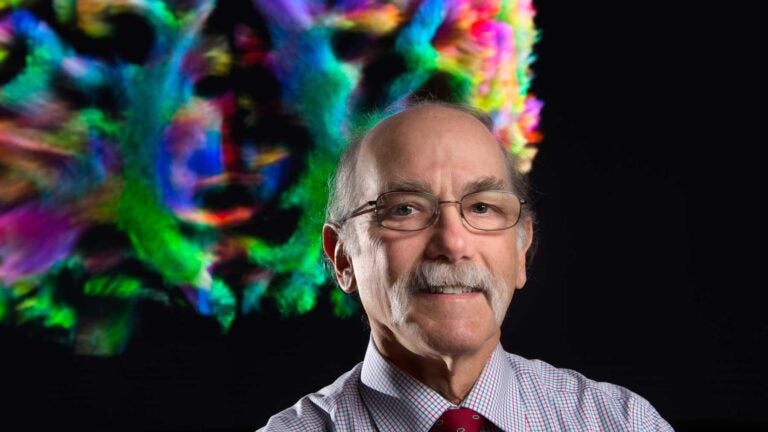
Arthur Toga is director of the USC Mark and Mary Stevens Neuroimaging and Informatics Institute. (USC Photo/Gus Ruelas)
USC 2017 | From scientists and students, breakthroughs and hard work that improve health and change lives
? Year in review: In the lab and the field, USC researchers are making a difference in Alzheimer’s, cancer, diet and more (Seventh in a 10-part series)
Some of the most fascinating accomplishments by Trojans in 2017 came from USC researchers, scientists, physicians and students who made headlines all year with discoveries on topics from dementia to dinosaurs and work with worldwide benefits. Take a look at some of their stories.
Making donated dollars count
In Malawi, health care depends on international aid. To understand how to allocate it wisely, two Keck School of Medicine of USC medical students traveled to Africa with used smartphones. Utilizing a free app, Peggy Ebner and Natalie Friedricks collected health care survey data. The results could help guide resource allocation wherever health care is scarce, including L.A.’s underserved communities.
https://news.usc.edu/127450/biotech-bootcamp-embraces-off-the-shelf-solutions-to-global-health-issues/
Why one USC researcher studies Alzheimer’s
Arthur Toga lost his grandmother, aunt and mother to Alzheimer’s disease. As a scientist, he knew what stages to expect, but nothing prepared him for “the degree of loss that you feel when you see somebody’s personality and their whole being erased.” He now directs a team of researchers trying to locate ways to fix or preempt neurodegeneration.
https://news.usc.edu/119535/the-close-to-home-reason-this-usc-brain-scientist-is-trying-to-figure-out-alzheimers/
Overweight children are excluded from friendships and disliked by peers
Overweight children have more one-sided friendships and frenemies than their thin peers. They are disliked and excluded from friendships. In return, they dislike more classmates. These negative interactions increase their risk of depression, poor eating habits and illness.
https://news.usc.edu/122245/overweight-children-are-excluded-from-friendships-and-disliked-by-peers-usc-study-finds/
Diagnostics just a breath away
By breathing into a tube for a few minutes, people could get an indication of their risk for breast cancer. The BreathLink device is being tested at the USC Norris Comprehensive Cancer Center. When BreathLink detects risk, patients are referred for further testing.
https://news.usc.edu/124822/a-simple-breath-test-could-be-the-next-step-in-diagnosing-breast-cancer/
Genetics put some older women at higher risk than men for Alzheimer’s
Elderly white women and men with a gene mutation linked to Alzheimer’s disease have the same chances of developing Alzheimer’s except during a crucial decade about 10 years after the start of menopause. The finding counters long-held beliefs that women are always at greater risk of the memory-erasing disease.
https://news.usc.edu/126237/genetics-put-some-older-women-at-higher-risk-than-men-for-alzheimers/
A few bites to lower blood pressure
Sweet potatoes, avocados, spinach, beans and bananas have something in common that could lower your blood pressure: potassium. USC researcher Alicia McDonough reviewed studies on dietary sodium, potassium and hypertension. Her conclusion: more potassium in the diet is associated with lower blood pressure.
https://news.usc.edu/119637/how-to-lower-your-blood-pressure-eat-more-fruit-and-veggies/
Air pollution may lead to dementia in older women
Excessive air pollution was shown to nearly double the risk of dementia for older women. Researchers said air pollution could be responsible for 21 percent of dementia cases. Tiny dirty particles get into the brain and cause inflammation that promotes dementia and Alzheimer’s disease.
https://news.usc.edu/115654/air-pollution-may-lead-to-dementia-in-older-women/
From mother to baby: ‘Secondhand sugars’ can pass through breast milk
Researchers found that breast milk can be infused with fructose derived from a mother’s diet. These “secondhand sugars” are not naturally present. Exposing babies and children to higher amounts of sugar can create cognitive development issues and can increase the child’s risk for obesity, diabetes, fatty liver disease and heart disease.
https://news.usc.edu/117042/from-mother-to-baby-secondhand-sugars-can-pass-through-breast-milk/
The next decade could bring a breakthrough in Alzheimer’s research
Scientists are five to 10 years away from developing a treatment for Alzheimer’s disease, a Keck School of Medicine of USC researcher predicts. Alzheimer’s disease is incurable. The U.S. Food and Drug Administration has approved a handful of medications for Alzheimer’s, but all of them merely treat symptoms.
https://news.usc.edu/129563/the-next-decade-could-bring-a-breakthrough-in-alzheimers-research-usc-expert-says/
Tiny fossils reveal backstory of the most mysterious amphibian alive today
Paleontologists found tiny fossils that link amphibians to wormlike creatures with a backbone and two rows of sharp teeth. The newfound fossil is the oldest relative of the most mysterious group of amphibians.
https://news.usc.edu/123473/tiny-fossils-reveal-backstory-of-the-most-mysterious-amphibian-alive-today/
Grandson’s memories inspire fight against Alzheimer’s
When a young Kwok Im was asked why he wanted to be a scientist, he thought of his grandfather, an Alzheimer’s patient. Now a third-year PhD student in the USC Neuroscience Graduate Program, Im is involved in research that could help inform future therapeutic treatments for the disease.
https://news.usc.edu/126221/inspired-by-his-grandfather-a-usc-student-takes-on-the-fight-against-alzheimers/
USC 2017 A 10-PART LOOK BACK
See more of our 10-part year-end package, which continues through Dec. 31.
